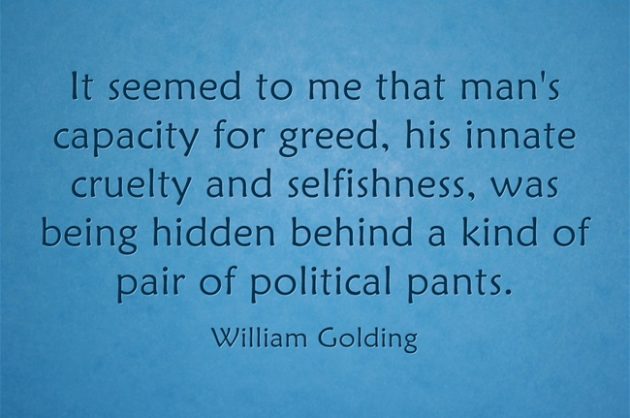We are offering support for students and teachers. Please click here.
Classic dystopian novels are experiencing a burst of popularity. The BBC has collated a list of current best-sellers that features George Orwell’s Nineteen Eighty-Four, Aldous Huxley’s Brave New World, and Sinclair Lewis’s formerly out-of-print It Can’t Happen Here. Lewis’s lesser known novel features ‘a charismatic demagogue, Berzelius “Buzz” Windrip, [who] runs for president on a promise to restore American greatness, dragging the country into fascism’.
It is easy to see why these books seem prescient. Take, for example, Kellyanne Conway’s interview in which she stated that White House Press Secretary Sean Spicer had provided ‘alternative facts’ on the crowd numbers attending Donald Trump’s inauguration as US President. ‘Alternative facts’ sounds like something straight from the Ministry of Truth in Nineteen Eighty-Four.
Margaret Atwood’s classic dystopian novel The Handmaid’s Tale has also just rocketed to the top of Amazon’s bestselling book chart. This feminist-inspired work portrays a society in which women’s rights are stripped away by an authoritarian and patriarchal government. These political changes happen subtly at first, but then culminate in a nightmare of servitude, including forced intercourse for procreation. The book cover has frequently appeared on placards during protests against Trump’s presidency. Some protestors have claimed that his executive order to stop federal funding to organisations which advise women on abortion mirrors Atwood’s political fable.
The conch
Golding’s most famous dystopian tale, Lord of the Flies, has featured in reporting of the 2016 US election campaigns. And in the early days of 2017 the conch has frequently been used as a touchstone of democracy.
Sam Leith, in the Guardian, discusses what he calls Trump’s ‘inarticulacy’ and states that in his first press conference, ‘He spoke less like a president than like a bad-tempered reality TV star with – in Lord of the Flies terms – a firm grip on the conch’. Leith acknowledges that Trump has been elected to high office, and therefore has the ‘right to speak’, but comments that Trump’s demeanour is not particularly Presidential.
Tom McCarthy, also in the Guardian, describes the conch as a symbol of democracy, rule of law, and due process. He argues that both Trump, and British Prime Minister Theresa May, are ‘conch-smashers’: ‘Trump’s disparagement of a judge for being of Mexican heritage and May’s refusal to condemn newspapers that more or less openly incited violence against justices who ruled against her places these two firmly in the conch-smashers’ camp’.
Torture and authoritarianism
There are other resonances between current political anxieties and Lord of the Flies. A particularly chilling incident, which often goes unnoticed by critics and readers, is the torture of Wilfred, a member of Jack’s tribe. Roger and Robert discuss Jack’s skills as chief, and Robert tells Roger that Jack’s ‘going to beat Wilfred’. Roger asks why, and Robert replies: ‘“I don’t know. He didn’t say. He got angry and made us tie Wilfred up. He’s been” – he giggled excitedly – “tied for hours, waiting”’. Peter Brook’s 1963 film, which sticks very closely to the novel, portrays this horrific scene starkly in ‘art house’ black-and-white.
Roger returns to the rest of Jack’s tribe and sees the ‘newly beaten and untied Wilfred’. He is excited by the promise of ‘irresponsible authority’ that this unreasoning and unjustified torture represents. Readers can be left in little doubt that this moment leads to the murder of Piggy and the planned torture of Ralph, with the stick ‘sharpened at both ends’. Jack, as chief, believes he does not have to consult the rest of the tribe about his decisions, nor does he have to explain them: a key feature of authoritarian governments.
Trump’s presidency so far has been scarred by elements of authoritarianism, with blatant attempts to ignore the constitution and issue orders that do not follow the legally correct channels of command. His executive order to ban immigrants from seven Muslim-majority countries from entering the US led to immediate chaos at airports all over the world, and promoted highly visible anxieties and protests relating to citizenship, human rights and ethnic/racial/religious discrimination.
This executive order has been temporarily blocked by a Seattle judge, and that judgement has been upheld by the federal appeals court in San Francisco. President Trump has responded furiously, calling Judge Robart in Seattle a ‘so-called judge’ and later tweeting: ‘SEE YOU IN COURT, THE SECURITY OF OUR NATION IS AT STAKE’ (capitalisation in original).
Both decisions blocking the travel ban have invoked important legal principles, with the appeals court reminding us that courts have a duty ‘in time of war as well as in time of peace, to preserve unimpaired the constitutional safeguards of civil liberty’. In a lecture entitled ‘Fable’, published in The Hot Gates, Golding discussed what inspired him to write Lord of the Flies. He suggested that anyone who had lived through the horrors of the Second World War, and the evils of authoritarian governments of the period, would understand that ‘man produces evil as a bee produces honey’.
Simon, Piggy and the voice of reason
The roles of Simon and Piggy in Lord of the Flies have frightening parallels with current politics. These boys represent reason and truth on the island. Simon is the only boy to understand the truth behind ‘the beast’. He cogently argues that it exists only within humans, hence there is no darker force at work. When he sees that the embodiment of the ‘beast’ is simply a dead parachutist, he is beaten to death by the boys before he can explain this.
Piggy frequently begs for order and reason: ‘Which is better, law and rescue, or hunting and breaking things up’? But he is drowned out by dissent and bullying. And eventually he is completely silenced when a huge rock, pushed by Roger, precipitates his death.
This wilful hostility to reasonable and logical arguments, as portrayed by Golding, seems to me reminiscent of global political conflicts in 2016 and 2017. During the debates leading up to the EU Referendum in the UK, leading ‘Brexiteer’ Michael Gove stated: ‘I think people in this country have had enough of experts’, dismissing a range of commentators who were arguing that if the UK left the EU, it would be disastrous for the economy and possibly for human rights. In the US election campaign, Hillary Clinton was derided by Trump for preparing herself with factual evidence for the televised debates. In both these examples, logic and reason are wilfully denied, or pointedly ridiculed, in support of a political result.
Fable
In Stephen King’s brilliant introduction to Lord of the Flies, he writes: ‘To me, Lord of the Flies has always represented what novels are for, what makes them indispensable.’ And in ‘Fable’, Golding wrote that people ‘do not much like moral lessons. The pill has to be sugared, has to be witty or entertaining, or engaging in some way or another’. It must harness the power of story.
Nineteen Eighty-Four shows us a fully achieved totalitarian regime; Lord of the Flies shows us how we get there. People are notoriously unable to heed the warnings of history. Let us hope that our leaders – and their followers – will take note of the warnings that literature so vividly provides.


